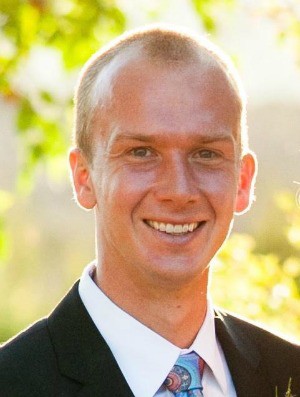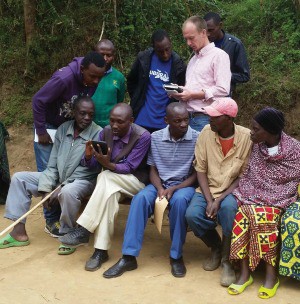
Eric Pohlman

Eric Pohlman working with farmers in Rwanda
Media Resources:
Press Release
For hi-res photos, right-click on images above
Eric Pohlman
RWANDA
Eric Pohlman, who currently serves as Rwanda Country Director and Senior Partner at the social enterprise One Acre Fund, was named the 2015 recipient of the “Norman Borlaug Award for Field Research and Application, Endowed by the Rockefeller Foundation.” The announcement of his selection was made by Rockefeller Managing Director for Africa, Dr. Mamadou Biteye, at the African Green Revolution Forum (AGRF) in Lusaka, Zambia on September 29, 2015.
A U.S. citizen, Pohlman began his work in Rwanda for One-Acre Fund in 2007 by visualizing and implementing a new approach to development that proved extremely successful. Rather than taking the traditional approach of allocating resources to high-value export crops, Pohlman realized that the most effective scalable activity was to formulate a singular, uniform solution for basic-food farmers. His fundamental insight was that among the poor populations of the world, the majority were subsistence farmers. And, the single, most dominant fact of their economic life was that they wanted to grow more food.
To that end, Pohlman focused One Acre Fund’s resources and energies on the production and marketing of local staple crops. He extended the rigors of the scientific method beyond solely pure genetic or chemical technology – and into behavioral technology. His breakthrough approach was to pair crop technology with behavioral technology to create truly broadly disseminated interventions that have produced positive results in rural African communities.
Through careful trial and error, and persistence equal to Dr. Borlaug’s, Pohlman helped develop the One-Acre Fund model, with its foundation in basic agricultural science and technology, surrounded with an ecosystem of behavioral technology that unlocks its potential. In practice, all of the participating subsistence farmers could access a small loan with a flexible repayment plan to use in purchasing seeds and fertilizer, and they received extension services on how to successfully grow their crops and market them for maximum profitability.
Implementing an early innovation in working with Rwandan farmers, Pohlman used a non-traditional extension model that accounted for the greater geographic distances between rural and urban areas, the important cultural differences, and Pohlman’s desire to make technology commercially viable. Instead of hiring educated agronomitst, He and his colleagues at One-Acre Fund trained local community leaders to disseminate the necessary technology education and training. Pohlman devised a system that relied more on face-to-face meetings as opposed to complicated written crop guides and rigid management “tools.”
He created a small army of farmer agents throughout Rwanda, numbering nearly five hundred full-time staff. Together, they are capable of conducting more than 1,000 small-group trainings a week. Serving farmers in this way creates leadership opportunities in the larger field—in 2016, fully ten percent of Rwanda’s population will e enrolled in Pohlman’s program.
In his own words: “I am one member of an amazing team at One Acre Fund. Today, a One Acre Fund field officer in Rwanda will walk miles to teach a farmer how to space her maize; a bookkeeper in Kenya will diligently data-enter a farmer’s credit payment; and a logistics officer in Burundi will overcome axle-breaking mud to get to the last mile. I am proud to serve beside three thousand One Acre Fund staff who every day carry on Dr. Borlaug’s legacy of ‘taking it to the farmer.’ His credo stirs us to do everything we can to deliver the best science and the best services to farmers because they have the most important job in our communities – growing our food.”


